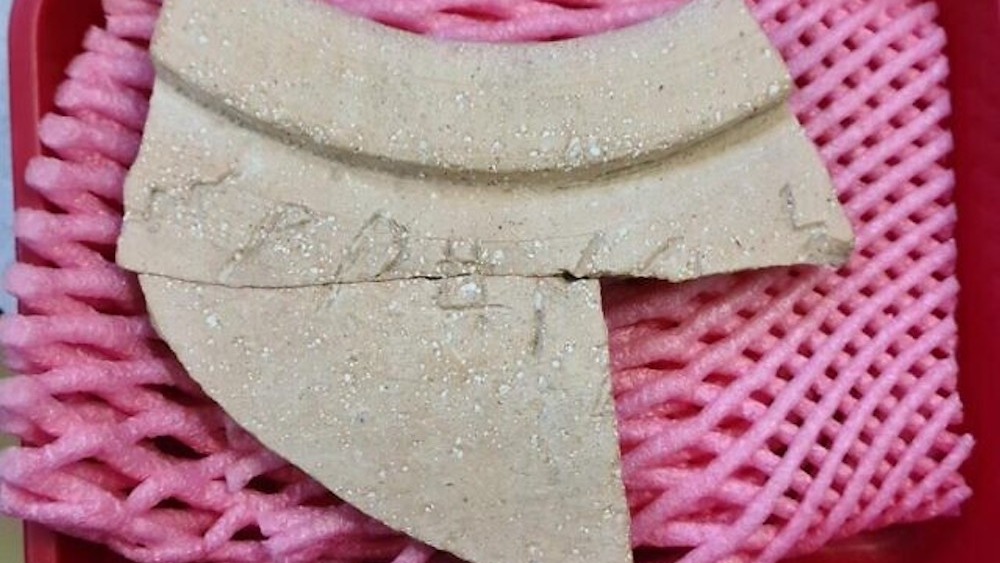Ancient inscription on jar found in Israel links kingdoms of Solomon and Sheba
A new study has deciphered a mysterious inscription on a jar unearthed in Israel that lists an ingredient for making incense.

Get the world’s most fascinating discoveries delivered straight to your inbox.
You are now subscribed
Your newsletter sign-up was successful
Want to add more newsletters?

Delivered Daily
Daily Newsletter
Sign up for the latest discoveries, groundbreaking research and fascinating breakthroughs that impact you and the wider world direct to your inbox.

Once a week
Life's Little Mysteries
Feed your curiosity with an exclusive mystery every week, solved with science and delivered direct to your inbox before it's seen anywhere else.

Once a week
How It Works
Sign up to our free science & technology newsletter for your weekly fix of fascinating articles, quick quizzes, amazing images, and more

Delivered daily
Space.com Newsletter
Breaking space news, the latest updates on rocket launches, skywatching events and more!

Once a month
Watch This Space
Sign up to our monthly entertainment newsletter to keep up with all our coverage of the latest sci-fi and space movies, tv shows, games and books.

Once a week
Night Sky This Week
Discover this week's must-see night sky events, moon phases, and stunning astrophotos. Sign up for our skywatching newsletter and explore the universe with us!
Join the club
Get full access to premium articles, exclusive features and a growing list of member rewards.
For more than a decade, archaeologists have struggled to decipher an inscription carved into the neck of a broken jar that dates back to King Solomon's reign in ancient Israel. Now, researchers have finally revealed the mysterious message's meaning.
Based on the new interpretation, published in January in the Jerusalem Journal of Archaeology, the inscription was engraved using Ancient South Arabian script in Sabaean, a common language that was spoken during biblical times on the Arabian Peninsula in the kingdom of Sheba, in what is today Yemen.
The text on the jar reads "ladanum 5," a reference to labdanum (Cistus ladanifer), an aromatic, plant-derived resin that was used to make incense, according to a Hebrew University of Jerusalem statement.
The inscription is thought to be the oldest known Ancient South Arabian script found in Israel, according to the study.
Related: King Solomon's mines were abandoned and became a desert wasteland. Here's why.
The shard of pottery — which archaeologists found buried alongside portions of six other large jars during a 2012 excavation in Ophel, a section of Jerusalem — dates to the 10th century B.C. Researchers consider it a "clear connection" to the biblical kingdom of Solomon and the nearby kingdom of Sheba, according to the statement.
"The vessel is locally made, and the inscription was engraved by a Sabaean speaker holding a position related to incense," study author Daniel Vainstub, an archaeologist at Ben-Gurion University of the Negev in Israel, told Live Science in an email. "That proves a strong relation between the two kingdoms."
Get the world’s most fascinating discoveries delivered straight to your inbox.
Centuries ago, the kingdom of Sheba was instrumental in cultivating the plants needed to produce perfume and incense, while the kingdom of Solomon controlled the trade routes that crisscrossed the Negev desert and led to the Mediterranean ports where goods were then exported, according to the study.
"Deciphering the inscription on this jar teaches us not only about the presence of a speaker of Sabaean in Israel during the time of King Solomon, but also about the geopolitical relations system in our region at that time — especially in light of the place where the jar was discovered, an area known for also being the administrative center during the days of King Solomon," Vainstub said in the statement.
"This is another testament to the extensive trade and cultural ties that existed between Israel under King Solomon and the Kingdom of Sheba," he said.
Jennifer Nalewicki is former Live Science staff writer and Salt Lake City-based journalist whose work has been featured in The New York Times, Smithsonian Magazine, Scientific American, Popular Mechanics and more. She covers several science topics from planet Earth to paleontology and archaeology to health and culture. Prior to freelancing, Jennifer held an Editor role at Time Inc. Jennifer has a bachelor's degree in Journalism from The University of Texas at Austin.
 Live Science Plus
Live Science Plus










